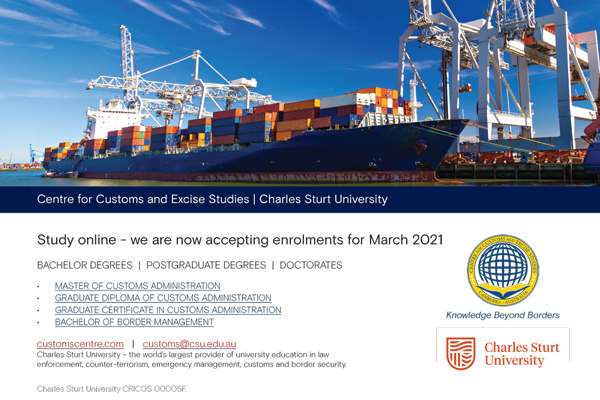Bahamas Customs takes the Mercator Programme to a new level
16 October 2018
By Andrea Hampton, WCO-Bahamas Training Programme ManagerEarlier this year, the WCO and the Bahamas Customs and Excise Department (BCED) embarked on an exciting partnership to employ a new model for Customs capacity building and technical assistance. For the first time, a national multi-year WCO Mercator Programme Implementation Plan has been combined with an intensive training delivery programme aimed at achieving specific results over the course of approximately 18 months.
The initiative is funded from a loan to The Bahamas Government by the Inter-American Development Bank, and benefits from the strong commitment of the Comptroller of Customs, Dr. Geannine Moss. She desires to bring the skills of her staff up to higher standards by implementing modern processes and practices that would contribute to facilitating trade, whilst ensuring compliance with the provisions of the World Trade Organization’s (WTO’s) Trade Facilitation Agreement (TFA). The Bahamas intends to accede to the WTO, and the BCED has a crucial role in preparing the country to do so.
Implementation plan
The WCO Mercator Programme was designed to assist governments in implementing the Customs trade facilitation measures outlined in the TFA. The Bahamas is the first country to take advantage of the Mercator Programme prior to accession to the WTO. This clearly demonstrates its commitment to adopt the WTO’s multilateral trade rules and standards, while recognizing that the benefits generated by the Programme can and do reach beyond WTO membership.
Under the Mercator Programme, capacity building is provided on the basis of a comprehensive needs assessment and development plan. Once gaps related to meeting the commitments under the TFA have been identified, multi-year action plans are developed to serve as roadmaps and mechanisms by which progress can be monitored. A WCO-accredited Mercator Programme Advisor (MPA) is assigned to support the administration throughout this process. In the case of The Bahamas, an MPA from US Customs and Border Protection has been assigned.
After a scoping mission in March 2018, the MPA and other WCO experts worked with the BCED to determine key areas for improvement. The product of this work is intended to assist the administration in better aligning itself with trade facilitation best practices and international standards such as the WCO Revised Kyoto Convention (RKC), which will assist with TFA compliance. In June 2018, these findings were addressed in a detailed Mercator Implementation Plan that:
- explains the specific steps needed to be taken by the BCED in order to align itself with TFA standards;
- identifies strategic links for each set of activities, including desired outputs and overall outcomes;
- specifies indicators that can be used to monitor implementation progress;
- assigns individual responsibilities to BCED executives, thus ensuring accountability and ownership;
- provides a timeline by which actions are to be taken;
- directs the BCED towards relevant WCO resources and tools to support each of the actions, drawing on the WCO’s TFA Implementation Guidance.
Training Agreement
As is the case in all countries benefiting from the Mercator Programme, this work was done in parallel with identifying critical areas for training needs within the Customs administration. What makes the approach adopted in The Bahamas unique, is the fact that, thanks to a Training Agreement with the WCO, the scale of technical assistance that will be delivered is unprecedented.
The training programme consists of 26 technical assistance and capacity building missions delivered by WCO experts. All themes covered during the missions support the attainment of specific objectives under the Mercator Programme and are relatable to articles of the TFA. They include core Customs functions such as risk management, valuation, classification, and rules of origin.
Focus is being directed towards measures contributing to a more predictable and transparent trading environment. Initiatives include advance rulings and the review and appeals procedures, as well as arrangements aimed at enhancing coordinated border management.
Assistance in the area of organizational development is also being provided. The aim is to support the BCED’s institutional capacity to deliver the necessary changes to meet the demands of traders and capture the full benefits expected from the imminent roll-out of an Electronic Single Window (ESW).
Emphasis has also been placed on sustainability. A number of BCED officers meeting the WCO pre-requisite profile will be trained as instructors so that they can, in turn, teach their peers. In addition, the WCO’s e-learning platform CLiKC! will also be used.
Much has already been achieved in only a few months. The programme of work has been intensive, with over 100 BCED officers having received training and technical assistance from the WCO covering 10 different areas to date. Among other core Customs TFA-related support:
- training on rules of origin was delivered to 25 participants, and a number of potential BCED trainers have been identified;
- risk management, advance rulings, and performance measurement legislation, policies, procedures and capabilities have been evaluated;
- the WCO supported the creation of a Time Release Study framework, plan and working group, which will be responsible for designing benchmarks to compare clearance performance before and after implementation of the ESW;
- 12 Superintendents and 12 Chief Customs Officers have benefited from the WCO’s intensive Leadership Management and Development training course;
- BCED staff members benefited from training on the WCO Data Model, and have since started mapping their data requirements to the Model in preparation for ESW implementation.
Conclusion
By pioneering this unique approach, which combines the Mercator Programme’s focus on results with intensive delivery of WCO technical assistance and capacity building missions that include the sharing of expertise, The Bahamas has become a showcase for the Caribbean sub-region. Its dynamic partnership with the WCO is a clear demonstration of the efficacy of the WCO’s wider Capacity Building Strategy.
More information
capacity.building@wcoomd.org

